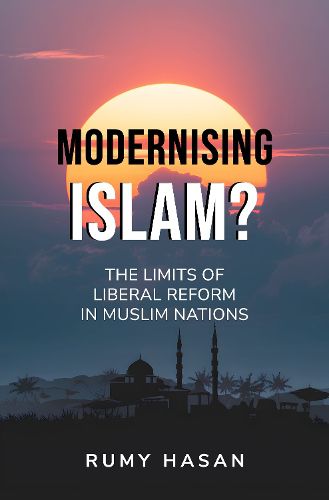Readings Newsletter
Become a Readings Member to make your shopping experience even easier.
Sign in or sign up for free!
You’re not far away from qualifying for FREE standard shipping within Australia
You’ve qualified for FREE standard shipping within Australia
The cart is loading…






This title is printed to order. This book may have been self-published. If so, we cannot guarantee the quality of the content. In the main most books will have gone through the editing process however some may not. We therefore suggest that you be aware of this before ordering this book. If in doubt check either the author or publisher’s details as we are unable to accept any returns unless they are faulty. Please contact us if you have any questions.
Modernising Islam? - The Limits of Liberal Reform in Muslim Nations explores the complex and often fraught attempts at modernisation in Muslim-majority countries. From Saudi Arabia's ambitious Vision 2030 to the UAE's drive for economic diversification, and from Turkey's reversal of Atatuerk's secular reforms to Tunisia's struggles post-Arab Spring, this book critically examines the challenges of reconciling liberal reforms with deeply entrenched religious and political structures.
Author Rumy Hasan provides a thought-provoking analysis of whether these reforms represent genuine progress or merely superficial adjustments to maintain power. Drawing on historical context and contemporary developments, he explores key issues, including the role of Sharia law, the status of women, freedom of expression, and the relationship between Islam and democracy.
With in-depth case studies spanning the Gulf states, North Africa, Southeast Asia, and Central Asia, this book questions whether meaningful change is possible in societies where religion remains deeply intertwined with governance. It also considers whether Saudi Arabia's recent reformist rhetoric could set a precedent for the wider Islamic world-or whether entrenched theological doctrines will continue to limit progress.
A compelling and incisive read, this book is essential for anyone interested in global politics, Middle Eastern affairs, and the intersection of religion and modernity.
This book is instructive, precise and very well documented. Taking in consideration different Islamic countries, it explains how difficult the reformation of Islam is. And when reforms have been adopted, there remains always the danger of cancelling them, as happened with Turkey after Atatuerk's death.
Rumy Hasan approaches difficult issues in the Muslim world with a sharp intellect and penetrating analysis.
Rumy Hasan is Associate Professor at SPRU, University of Sussex and a Visiting Professorial Research Fellow at Civitas. His previous books include Multiculturalism: Some Inconvenient Truths; Dangerous Liaisons: The Clash between Islamism and Zionism; Religion and Development in the Global South; and Modern Europe and the Enlightenment.
$9.00 standard shipping within Australia
FREE standard shipping within Australia for orders over $100.00
Express & International shipping calculated at checkout
This title is printed to order. This book may have been self-published. If so, we cannot guarantee the quality of the content. In the main most books will have gone through the editing process however some may not. We therefore suggest that you be aware of this before ordering this book. If in doubt check either the author or publisher’s details as we are unable to accept any returns unless they are faulty. Please contact us if you have any questions.
Modernising Islam? - The Limits of Liberal Reform in Muslim Nations explores the complex and often fraught attempts at modernisation in Muslim-majority countries. From Saudi Arabia's ambitious Vision 2030 to the UAE's drive for economic diversification, and from Turkey's reversal of Atatuerk's secular reforms to Tunisia's struggles post-Arab Spring, this book critically examines the challenges of reconciling liberal reforms with deeply entrenched religious and political structures.
Author Rumy Hasan provides a thought-provoking analysis of whether these reforms represent genuine progress or merely superficial adjustments to maintain power. Drawing on historical context and contemporary developments, he explores key issues, including the role of Sharia law, the status of women, freedom of expression, and the relationship between Islam and democracy.
With in-depth case studies spanning the Gulf states, North Africa, Southeast Asia, and Central Asia, this book questions whether meaningful change is possible in societies where religion remains deeply intertwined with governance. It also considers whether Saudi Arabia's recent reformist rhetoric could set a precedent for the wider Islamic world-or whether entrenched theological doctrines will continue to limit progress.
A compelling and incisive read, this book is essential for anyone interested in global politics, Middle Eastern affairs, and the intersection of religion and modernity.
This book is instructive, precise and very well documented. Taking in consideration different Islamic countries, it explains how difficult the reformation of Islam is. And when reforms have been adopted, there remains always the danger of cancelling them, as happened with Turkey after Atatuerk's death.
Rumy Hasan approaches difficult issues in the Muslim world with a sharp intellect and penetrating analysis.
Rumy Hasan is Associate Professor at SPRU, University of Sussex and a Visiting Professorial Research Fellow at Civitas. His previous books include Multiculturalism: Some Inconvenient Truths; Dangerous Liaisons: The Clash between Islamism and Zionism; Religion and Development in the Global South; and Modern Europe and the Enlightenment.